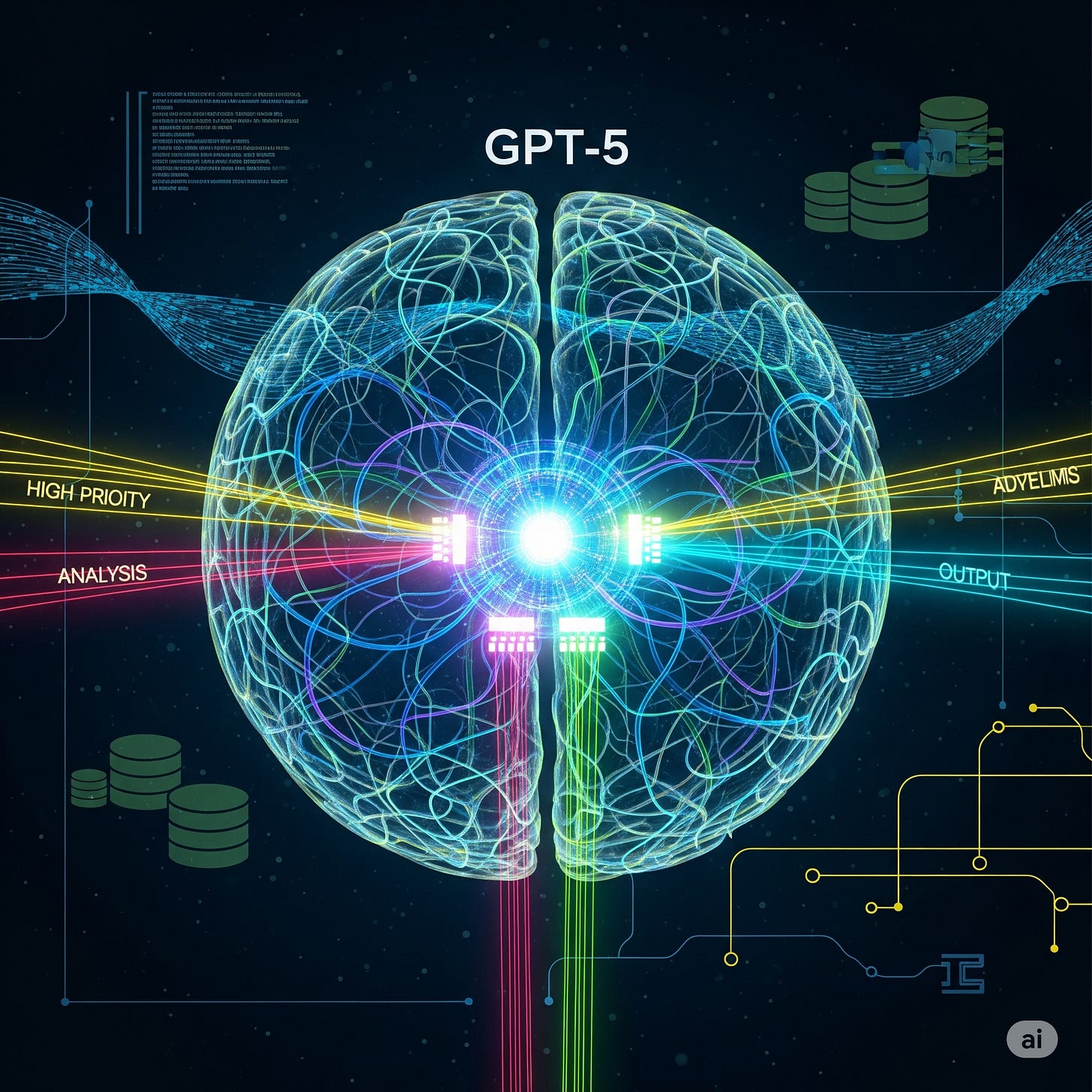🧠 When Your AI Starts Thinking: GPT-5's Game-Changing Routing Revolution
AI and Data Engineering updates #edition30
What's on the list today?
Tech News
GPT-5 drops with game-changing capabilities 🤖
GlobalGPT unifies all major AI models in one subscription 🌍
Databricks Updates
Side-by-side notebook editing 📝
Real-time streaming goes sub-second ⚡
New DBR
AI/Data Engineering Tips
Smart Prompt Versioning
Learn fast with AI
📰 Tech News
GPT-5: The Model That Routes Itself
OpenAI dropped GPT-5 this week, and it's not just another incremental update—it's a fundamental shift in how AI models operate. The standout feature? Intelligent routing.
GPT-5 automatically chooses which sub-model to use based on your prompt complexity. Simple questions get routed to faster, lighter models, while complex problems trigger the "thinking" mode for deeper consideration. The result? Noticeably faster responses across the board.
What's changed for engineers:
Now the default for all ChatGPT users (including free tier) 🎉
Premium users get access to "GPT-5 Thinking" mode
One user noted: "It no longer waits for instructions, but simply does things" - potentially marking the end of prompt engineering as we know it
Excellent at coding, solid at writing, but image generation remains unchanged
GlobalGPT: One Subscription to Rule Them All
Tired of juggling multiple AI subscriptions? GlobalGPT promises to solve that headache by bundling GPT-4.5, GPT-4o, Claude 4, Gemini 2.0 Pro, and more into a single subscription. For data engineers who need different models for different tasks, this could be a game-changer for both productivity and budget management.
🧱 Databricks Updates: July/August Roundup
Side-by-Side Notebook Editing
Finally! You can now edit notebooks side by side in Databricks. Click the split view button or drag a notebook tab to the right. This is huge for comparing code, referencing documentation, or collaborating on complex analyses.
Databricks Runtime 17.1 is GA
The latest runtime brings performance improvements and enhanced compatibility. Check the release notes for specific optimizations that might benefit your workloads.
Real-Time Streaming Goes Sub-Second ⚡
The game-changer: Real-time mode for Structured Streaming is now in public preview. This trigger type enables sub-second latency data processing—perfect for operational workloads requiring immediate response to streaming data.
Use cases:
Fraud detection systems
Real-time personalization
IoT sensor monitoring
Live dashboard updates
This brings Databricks into serious competition with dedicated streaming platforms for ultra-low-latency scenarios.
🤖 AI/Data Engineering Tips
There are two camps in tech right now: those avoiding AI thinking it'll replace them, and those "vibe coding" without understanding the fundamentals. Both are missing the real opportunity.
The third way: Use AI as your personal coding coach, not just a code generator.
Here's how to turn GitHub Copilot into your mentor instead of your crutch:
Set up coaching mode in VS Code:
Open Command Palette and run:
> Chat: New Instructions FileAdd these coaching instructions:
---
applyTo: "**"
---
I am learning to code. You are to act as a tutor; assume I am a beginning coder. Teach me concepts and best practices, but don’t provide full solutions. Help me understand the approach, and always add: "Always check the correctness of AI-generated responses."How it works: Instead of getting complete code blocks, Copilot will explain concepts, suggest approaches, and ask you guiding questions. You learn the "why" behind the code, not just the "what."
Benefits: This approach builds genuine understanding while leveraging AI's speed. You develop problem-solving skills that transfer across languages and frameworks, making you a stronger engineer rather than just a faster copy-paster.
Pro tip: The more specific your questions, the better your AI coach can guide you. Ask "Why does this pattern work here?" instead of "Write this function for me."
Smart Prompt Versioning
Track your prompt performance like you track code versions. Small changes in prompts can dramatically impact AI model outputs.
python
PROMPTS = {
"v1.0": "Analyze this data and provide insights",
"v1.1": "Analyze this data and provide 3 key insights with evidence",
"v1.2": "As a data analyst, examine this data and provide exactly 3 key insights. For each insight, include supporting evidence and potential business impact."
}
def get_prompt(version="latest"):
return PROMPTS.get(version, PROMPTS["v1.2"])Benefits: Systematic prompt evolution helps you understand what works best for your specific use cases. Track metrics like response quality, consistency, and task completion rates for each version.



